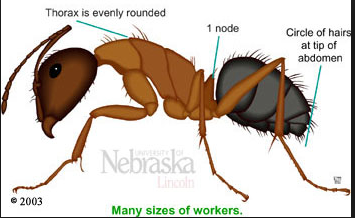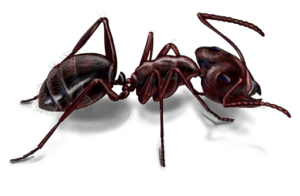Why do Ants Keep Coming Back?
We have all at some time or the other been driven to distraction by returning ants. Sometimes they just appear to be impossible to get rid of despite using all the tricks in the book. But just why and how do they keep returning to our homes and in such large numbers?
The answer is pretty simple really and the answer is two-fold. It is the size of their colony and their amazing communication ability. Unlike other insects like spiders and bugs that work independently, ants work together in exceptionally large colonies and continually rely on one another. It only takes one single ant to march into your home for all the trouble to begin. That single insect will communicate through the use of pheromones to the other members of its colony. Pheromones release hormonal chemicals in their bodies allowing messages to travel back and forth. And those messages will be clear and simple – food. The others will simply follow the first ant’s scent trail and they will keep returning to that place looking for that continual food source. 
They will always find the way – by following the pheromone trail and before you know it, there are hundreds of them returning to the same spot continuously. If the insects have found their way into your kitchen or a place where there is a continual food source, then the visits will not cease. With a permanent supply of food and their powerful communication technique this could be a big problem. Bearing in mind that ants are active all year round, you must invest time and energy in locating and destroying the colony before it gets out of hand. Crushing ants is not the answer and is actually detrimental as if the Queen finds out that ants are being destroyed she will simply go into overdrive and increase her egg laying production. One thing you don’t want to do is make the Queen angry!
If your ant problem is outside in your yard and they keep returning to the same spot – follow the trail and locate the colony. It’s not hard. If they have built their colony inside the soil in your garden, then they will push away the earth as they forage and nest until it resembles a fine powder. You can spot an ant hill easily simply because it will not look like the rest of the soil. A simple way to stop them coming back is to pour boiling water on top of it. You may need to do it a few times as there may be a few colonies within close proximity to one another and they will be travelling between them. If you cannot bare to destroy a colony – dig it up and move it somewhere else. Although be aware that you may leave the Queen behind which would be a disaster.
If your ant problem is inside your home in your floorboards or skirting boards, and they keep returning, then unfortunately you do have a bigger issue on your hands. There are things that ants hate and its worth trying all of them as depending on the climate of where you are and the type of ants you have, what does not work for someone else might work perfectly for you. Try to resist poisons. They might kill the insects but they will NOT destroy a colony and are not safe around pets and small children.
Lemon & Citrus – ants cannot tolerate the citrus in lemons. Squeeze a fresh lemon, pour into a spray bottle, add a little lemon-based washing up liquid (Ecover is perfect), and top up with water. Spraying the ants with this concoction will kill them on contact. It won’t help to destroy the colony but it can help immensely if you have found cracks and crevices that they are continually coming out from. Be liberal and spray these entrances continuously or plug the crevices up with liquid dish soap to form a plug. Keep the spray bottle filled up at all times, ready for action.
Chalk – this treatment works for some people with infestations. Some ants will not cross a chalk line. Draw a chalk line where they are coming in and monitor the situation. If they don’t cross the line, then this is a simple method of stopping them coming in altogether – although your house may look pretty weird for a while.
Cinnamon – some people have had success with cinnamon powder as it is reported that ants do not like the smell. Fill up cracks and crevices and monitor the situation. Bear in mind that while this is a non-toxic approach to ant control, cats and dogs do not like cinnamon and you may find your pets will be not be happy and will prefer to stay away while cinnamon is being used.
Destroy the ant trail – use lemon based liquid dish soap and boiling water where possible. Wash and spray the areas liberally as the combination will destroy pheromone trails and confuse the ants as they rely on the trail to get from A to B. Do bear in mind what type of floor you have before you pour boiling water on to it to minimize any potential damage to flooring.
Use boiling water to destroy the colony. It is possible to knock out the whole colony if its external. You need to locate it first and it is very often in soil or cracks in patios or walls but once you do, liberally apply boiling water on it. You may need to repeat a few times and there may be more than one colony located within the vicinity. Keep monitoring trails and activity and keep pouring.

Ant bait – if you have located the colony internally you can bait it. However, remember bait is poisonous to pets and small children so use with extreme caution. Better still, if you want to use bait, bring in an expert to do it for you.
Keep clean – sounds basic but if there is no food source then there are no ants. While it’s impossible to stop crumbs falling onto the kitchen floor, work-top or dining areas, clean up and wash up immediately to stop those pesky ants coming in and returning.
Contact us





